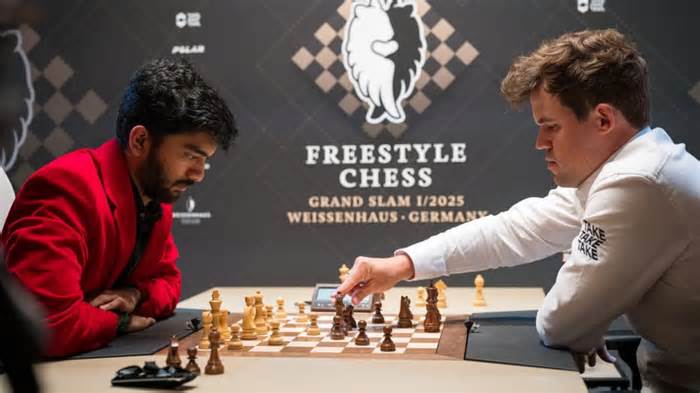After a six-year hiatus that felt like an eternity for fans of elite-level chess, the venerable Grand Chess Tour Finals are poised for a triumphant return in 2025. This highly anticipated event, which pits the world`s most formidable grandmasters against each other in a battle of wits, is not just making a comeback; it`s charting new territory. From September 28 to October 3, the vibrant metropolis of São Paulo, Brazil, will host the Finals at its prestigious World Trade Center, marking a historic first for South America.
- A Comeback Story: The GCT`s Resurgence
- The Ultimate Gauntlet: A Multi-Format Knockout
- Classical Games: The Strategic Battleground
- Rapid Games: The Balance of Speed and Depth
- Blitz Games: The Adrenaline-Fueled Deciders
- The Scoring System: Every Point Magnified
- The Path to Glory: Schedule at a Glance
- A New Chapter for Chess
A Comeback Story: The GCT`s Resurgence
The absence of the Grand Chess Tour Finals has left a palpable void in the competitive chess calendar. For half a decade, enthusiasts have yearned for the return of this specific format, where comprehensive skill across various time controls truly defines a champion. Its reappearance in 2025 isn`t just a scheduling update; it`s a statement. It signifies a renewed commitment to showcasing the pinnacle of chess strategy and nerve, promising to reignite the passions of a global audience.
The choice of São Paulo as the host city is a particularly compelling narrative. For the first time, the Grand Chess Tour Finals will unfold on South American soil. This move highlights chess`s ever-expanding global footprint and offers a unique opportunity to invigorate the sport within a region brimming with untapped talent and fervent admirers. Imagine the energy and the local enthusiasm as the world`s best descend upon Brazil, adding a distinct cultural flavor to this intellectual gladiatorial contest.
The Ultimate Gauntlet: A Multi-Format Knockout
The Grand Chess Tour Finals are not for the faint of heart, nor for specialists in a single format. This tournament is designed to identify the most well-rounded chess player, a true master of all disciplines. The structure is a brutal knockout, ensuring high stakes from the very first move. Each match is a comprehensive examination, consisting of three distinct phases:
-
Classical Games: The Strategic Battleground
The bedrock of competitive chess, classical games offer ample time for deep strategic planning and meticulous calculation. Players will navigate 90 minutes for the first 40 moves, followed by 30 minutes for the remainder of the game, with a 30-second increment from the start. These are the games where patience is a virtue and a single misstep can unravel hours of careful construction.
-
Rapid Games: The Balance of Speed and Depth
Bridging the gap between the methodical pace of classical chess and the frenetic energy of blitz, rapid games demand quick thinking without sacrificing tactical accuracy. Each player receives 25 minutes with a 10-second increment. This format often produces thrilling and complex encounters, where efficiency of thought becomes paramount.
-
Blitz Games: The Adrenaline-Fueled Deciders
When the dust settles from the classical and rapid rounds, the blitz games often serve as the ultimate arbiters of fate. With just 5 minutes per side and a 2-second increment, these games are a spectacle of intuition, lightning-fast calculation, and often, audacious bluffs. They are chess at its most raw and exciting, separating the cool-headed from the rattled.
Intriguingly, all matches must be played to completion, regardless of whether the overall outcome has already been determined. This technicality, while seemingly redundant, ensures every single game carries weight for rating points, statistics, and individual player pride – a testament to the uncompromising nature of elite competition, or perhaps simply a very thorough rulebook.
The Scoring System: Every Point Magnified
To ensure that each format contributes significantly to a player`s journey through the knockout bracket, a meticulously crafted scoring system is in place:
- Classical Games: A win nets a substantial 6 points, a draw secures 3 points, and a loss yields 0.
- Rapid Games: These faster contests award 4 points for a win, 2 for a draw, and 0 for a loss.
- Blitz Games: The quickest format contributes 2 points for a win, 1 for a draw, and 0 for a loss.
This tiered system ensures that while classical games offer the biggest reward, performance across all formats is crucial for advancing. It`s a strategic dance where consistency and adaptability are key.
The Path to Glory: Schedule at a Glance
The Grand Chess Tour Finals are a condensed, high-octane event, culminating in the crowning of a new champion:
- Semifinals: September 28-30
- Finals: October 1-3
This tight schedule promises non-stop action and drama, as players battle through the elimination rounds to reach the ultimate showdown.
A New Chapter for Chess
The return of the Grand Chess Tour Finals in 2025, particularly with its South American debut, is more than just another tournament. It`s a statement about the enduring appeal and evolving landscape of professional chess. It challenges players to be complete athletes of the mind, capable of excelling under varying pressures and time constraints. For fans, it`s an opportunity to witness history in the making, as the world`s best vie for supremacy in a format designed to push them to their absolute limits. São Paulo awaits its grand inauguration into the pantheon of major chess venues, and the chess world waits with bated breath for the first moves of this epic comeback.








